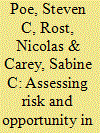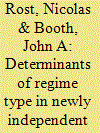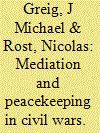|
|
|
Sort Order |
|
|
|
Items / Page
|
|
|
|
|
|
|
| Srl | Item |
| 1 |
ID:
072551


|
|
|
|
|
| Publication |
2006.
|
| Summary/Abstract |
Over the past two decades, substantial progress has been made toward a theoretical understanding of why physical integrity abuses are committed. Unfortunately, these theoretical developments have been devoid of much practical application. In this article, the authors explore the feasibility of risk assessment in the study of these human rights. Borrowing an approach by Gurr and Moore, they construct a risk assessment vehicle that uses existing models and data to develop expectations about future increases and decreases in human rights abuses. Their results indicate that we can isolate a set of cases that are at a higher risk of experiencing increased human rights abuse in the following year, as well as those that are ripe for better protection of human rights. The authors expect these risk and opportunity assessments to be of interest to students of conflict and peace studies, as well as to human rights activists and policy makers.
|
|
|
|
|
|
|
|
|
|
|
|
|
|
|
|
| 2 |
ID:
083265


|
|
|
|
|
| Publication |
2008.
|
| Summary/Abstract |
Abstract. Since 1945, newly independent states have differed from longer lived states in their greater risk of violent conflict and more challenging environment for democratisation. The authors of this article theorise that certain economic, demographic, violence-related and external factors should affect the regime type (level of democracy versus autocracy) in newly independent states. Examining exclusively newly independent states that have undergone major political transitions allows one to determine factors favouring democracy over autocracy under such volatile circumstances. The authors test several hypotheses, using cross-sectional and cross-sectional time-series analyses, and find that economic development elevates the level of democracy in new states. Cultural heterogeneity has no effect, but external factors play an important role. Genocide and politicide reduce democracy, while civil wars have the opposite effect. These findings prove robust to alternative measurements of the dependent variable and alternative model specifications
|
|
|
|
|
|
|
|
|
|
|
|
|
|
|
|
| 3 |
ID:
122766


|
|
|
|
|
| Publication |
2013.
|
| Summary/Abstract |
The occurrence of outside mediation and peacekeeping has increased exponentially since the end of the Cold War. But how do third-party states and international organizations decide which civil wars to intervene in? And how do they decide whether to mediate talks between the warring parties or to send peacekeepers? In this study, we propose that third parties are influenced by their interests in a civil war country, they take into account the urgency a civil war poses, and they shy away from particularly challenging civil wars. Empirical tests confirm some of these hypotheses but also yield some contrary results. In contrast to much of the empirical literature, which has mostly treated different conflict management tools separately, this study combines two of the most important aspects of international conflict management - mediation and peacekeeping - into one theoretical framework.
|
|
|
|
|
|
|
|
|
|
|
|
|
|
|
|
| 4 |
ID:
103714


|
|
|
|
|
| Publication |
2011.
|
| Summary/Abstract |
Why and when do states take the burden upon themselves to send peacekeepers into a civil war, rather than relying on intergovernmental organizations to do so? While there are a few empirical studies on the conditions under which the UN sends peacekeeping missions, no such analyses of state-conducted peacekeeping exist. In this study, a theoretical framework on state-conducted peacekeeping in civil wars is developed and empirically tested. Not surprisingly, when acting outside international organizations, states are able to take their own interests directly into account and select those civil wars to which they send peacekeepers accordingly. States' interests play a much greater role here than, for example, the interests of the major powers do for UN peacekeeping. When states send peacekeepers they are more likely to choose former colonies, military allies, trade partners, or countries with which they have ethnic ties. Yet, this does not mean that state-conducted peacekeeping occurs only where states see their own interests. Contrary to conventional wisdom, states also provide peacekeeping to 'tough' cases, the most challenging civil wars. These are long, ethnic wars. This tendency for states to provide peacekeeping holds when civil wars produce dire effects on civilians. States are more likely to send peacekeepers into civil wars that kill or displace many people. Finally, states react to opportunities: the more previous mediation attempts, the higher the chances for state-conducted peacekeeping.
|
|
|
|
|
|
|
|
|
|
|
|
|
|
|
|
|
|
|
|
|